中考英语情态动词详细用法归纳及练习含答案
人教新目标中考英语常用语法知识——情态动词知识点总结(含答案解析)

一、选择题1.Please let me ________you if you meet trouble.A.help B.to help C.helps D.helping A解析:A【解析】【详解】句意:如果你遇到困难请让我帮助你。
考查固定搭配。
help动词原形;to help动词不定式;helps动词三单;helping动名词。
分析句子可知,此处用于let sb. do sth.结构中,所以用动词原形,故选A。
2.Don’t ________ your glass too _______.A.fill; full B.fill; filled C.full; full D.full; filled A解析:A【解析】【分析】【详解】句意:不要把你的杯子倒得太满。
考查动词和形容词辨析。
fill填充,动词;full满的,形容词。
本句是否定祈使句,前空需用动词,full是形容词,可排除CD两项。
后句too (太)是形容词,修饰形容词或副词。
根据句意语境,可知选A。
3.Don’t________ in the classroom. It’s important ________ quiet when you study. A.talk, keep B.to talk, keep C.talk, to keep D.to talk, to keep C 解析:C【解析】【详解】句意:不要在教室里交谈。
当你学习的时候保持安静是重要的。
talk交谈,原形;to talk交谈,动词不定式;keep保持;原形;to keep保持,动词不定式。
第一空是否定祈使句,其结构是Don’t+动词原形。
排除BD;It’s important+to do sth.表示做某事是重要的。
排除A。
根据题意,故选C。
【点睛】祈使句的否定结构是以“Don”t+动词原形”开头.例如:Don”t go there,please.请别去那儿.Don”t be late.不要迟到.4.Mike, __________ make any noise, your father is sleeping.A.not B.don't C.won't D.can't B解析:B【解析】【详解】句意:麦克,不要吵闹,你父亲正在睡觉。
中考英语 情态动词 (含答案)

—Wow! This is delicious!
A.must
答案
B.will
C.shall
D.can
B 句意:——尝一尝这个汤,你会喜欢的。——哇!这个很好喝!本题考查情态动词。A:必须;B:会;C:
应该;D:能,可以。根据答句中“这个很好喝”可知此处应该表达“你会喜欢的”,故本题选择B。
5.(2019黑龙江齐齐哈尔,5)—The summer vacation is coming. Have you made a plan for it?
8.(2019广东,42)Dirty air and water are harmful. They kill plants, and even people.
A.can
答案
B.can't
C.should
D.shouldn't
A 句意:肮脏的空气和水是有害的。它们能杀死植物甚至人。本题考查情态动词。can能;can't不
A.must
答案
B.could
C.would
this Sunday.
D.should
C 句意:杰里没有把钱还给我,但是他许诺本周日还我。本题考查情态动词的用法。A.必须;B.可
以;C.会,将会;D.应该。根据he promised及时间状语this Sunday可知宾语从句的时态为过去将来时,故选C
D.needn't
C 句意:——有些人在一开始时没表现出他们的天赋。——我同意。即使爱因斯坦也是到他7岁
时才能阅读。本题考查情态动词。can't不能;mustn't禁止;couldn't不能,can't的过去式;needn't不需要。根
情态动词的用法及练习(附答案)

情态动词的用法及专项练习第1 & 2类:词形词的含义例句can ①“能力”②“允许”③“可能性”(0%)④“请求”I can speak English.Can I go to the toilet.It can’t be Susan. She is in Paris. Can you help me?could ①“过去的能力”②“过去的允许”③“可能性”(30%)④“请求”, 比can更客气⑤“建议”⑥“将来的一种可能性”She could speak English When she was 5 years old. Could I borrow your dictionary?It could get much colder in January.Could you please say that again more slowly.We could try to fix it ourselves.I think we could go to war again.be able to “能力”= can, 但比can的时态更具多样性。
can无法表达的时态,用be able to表达。
She will be able to teach English. (一般将来时)She was able to talk when she was 2 years old. (一般过去时)I would love to be able to play the piano. (动词不定式)may ①“请求、允许”(比较礼貌)②“将来的可能性”(50%)③may 在更多的时态中经常May I come in?It may rain tomorrow.第1类:十大情态动词can / could / may / might / must / ought to / shall / should / will / would 第2类:半情态词及充当情态动词的词had better / be able to / have to / used to / need / dare用be allowed to来代替might “较小的可能性”(≤30%)I might move to Canada some day.must ①“必须”(责任、义务)②“可能性”(推测) (100%)③“禁止”(否定式) Everyone must pay taxes.She didn’t arrive. She must be sick.You mustn’t p l ay with fire. It’s dangerous.have to ①“必须、不得不”(客观上不得不做)②多种时态里面代替“must”,因must只有一般现在,但have to 可以有多种时态。
九年级英语情态动词用法总结(完整)含答案
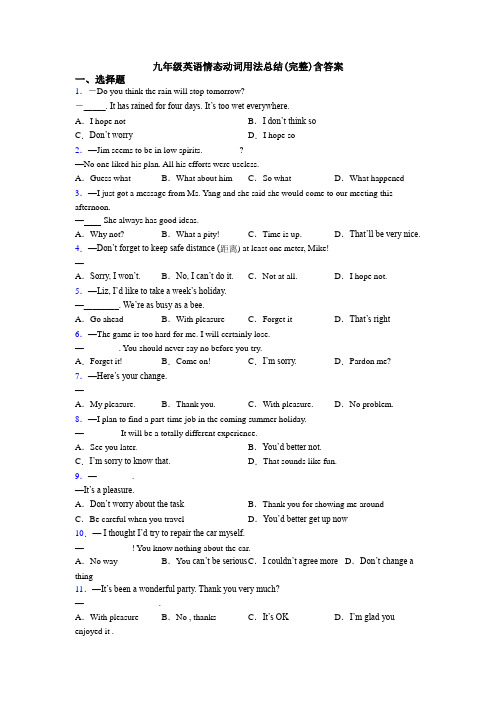
九年级英语情态动词用法总结(完整)含答案一、选择题1.-Do you think the rain will stop tomorrow?-_____. It has rained for four days. It’s too wet everywhere.A.I hope not B.I don’t think soC.Don’t worry D.I hope so2.—Jim seems to be in low spirits. ________?—No one liked his plan. All his efforts were useless.A.Guess what B.What about him C.So what D.What happened 3.—I just got a message from Ms. Yang and she said she would come to our meeting this afternoon.— She always has good ideas.A.Why not? B.What a pity! C.Time is up. D.That’ll be very nice. 4.—Don’t forget to keep safe distance (距离) at least one meter, Mike!—________A.Sorry, I won’t.B.No, I can’t do it.C.Not at all. D.I hope not. 5.—Liz, I’d like to take a week’s holiday.—________. We’re as busy as a bee.A.Go ahead B.With pleasure C.Forget it D.That’s right 6.—The game is too hard for me. I will certainly lose.—________. You should never say no before you try.A.Forget it! B.Come on! C.I’m sorry.D.Pardon me? 7.—Here’s your change.—________A.My pleasure. B.Thank you. C.With pleasure. D.No problem. 8.—I plan to find a part-time job in the coming summer holiday.—________ It will be a totally different experience.A.See you later. B.You’d better not.C.I’m sorry to know that.D.That sounds like fun.9.—________.—It’s a pleasure.A.Don’t worry about the task B.Thank you for showing me aroundC.Be careful when you travel D.You’d better get up now10.—I thought I’d try to repair the car myself.— __________ ! You know nothing about the car.A.No way B.You can’t be serious C.I couldn’t agree more D.Don’t change a thing11.—It’s been a wonderful party. Thank you very much?—- ________________.A.With pleasure B.No , thanks C.It’s OK D.I’m glad you enjoyed it .12.—Can I look at the menu for a few more minutes before I decide?—Of course. ________, Sir.A.Make yourself at home B.Enjoy yourself C.It doesn’t matterD.Take your time13.--Would you mind opening the window? It’s too hot.--__________.A.Sorry. I wouldn’t.B.No, of course not.C.It doesn’t matter.D.Yes, please.14.—Another Friday! Let’s go to see the play tonight.—________ I will book the tickets online.A.My pleasure. B.That’s right.C.Why not? D.Never mind. 15.— Could you please clean your room?—_________. I’ll do it at once.A.Yes, sure B.Sorry, I can’t C.It doesn’t matter D.Here you are 16.— What do you think of the movie Mr. Bea ?—____. It’s very funny.A.I can’t stand it .B.I don’t mind it C.I love it. D.I hate it. 17.—Lucy, can you help me with my history?—________. I am good at it.A.With pleasure B.I’m afraid not C.Sorry, I can’t D.No way 18.—TV says there will be a heavy rain tomorrow.—________. I planned to go climbing with my friend.A.Bad luck B.I hope so C.Good idea D.I don’t mind 19.—I missed the basketball game last Saturday because I had an exam.—________, but it will be repeated on TV.A.Take it easy B.You are lucky C.That’s wonderful D.Never mind 20.—Do you like cartoons or scary movies?—_______. They can cheer me up.A.Yes, I do B.No, I don't C.Cartoons D.Scary movies 21.—I’m sorry I didn’t make it to your birthday party last night.— ________ I know you are busy recently.A.Why not? B.Don’t mention it.C.No way. D.That’s all right. 22.—Excuse me, can you give me some water? The cup is empty.—________A.Go ahead. B.My pleasure C.At your service D.You’d better not. 23.—You seem so happy today, Jack.—________? I won the first prize in the singing competition yesterday.A.So what B.How come C.Guess what D.Why not 24.—I’m going hiking this afternoon. Would you like to go wit h me?—______, but I must finish my homework first.A.Sorry, I don’t B.That’s right C.I’d love to D.Not at all 25.—I prefer western food. It’s delicious and good for us.—_______ ? But western food is said to be high in sugar and fat.A.Is that right B.How do you know thatC.Do you really think so D.Who told you that26.— Do you think Steve will pass the exam this time?— ________! He spends most of his time playing games on the phone.A.Promise B.No way C.Well done D.No problem 27.—Can you tell me how to get to the park?—________—Thank you all the same.A.Show me the map, please.B.Certainly. It’s opposite the museum.C.Sorry, I don’t know. I’m a stranger here.D.Sure. Turn right and go along Rock Road.28.—How would you like your soup?—________.A.Very delicious B.With some tomatoes and eggs, pleaseC.I like it very much D.No, thanks29.—Don’t keep the water running when you brush your teeth.— ________ .A.I hope so B.I’m afraid not C.Sorry, I won’t D.It’s nothing 30.—How do you find the documentary DA VID Profile(国宝档案).—________. I can’t think too highly of it.A.It all depends B.It’s really wonderfulC.No one knows for certain D.It is not my cup of tea31.—Would you mind if I open the window?—_______.We need fresh air.A.Not at all B.Yes, of course C.You’d better not D.That’s all right 32.—I find it really unwise to go travelling during May Day holiday.—________! Wherever you go, it’s crowded with cars and people.A.Not exactly B.Forget it C.You said it D.It depends 33.— Why will you take part in the charity walk? You are not good at running at all.— ________. I run to show that I can help others.A.Not exactly B.That’s not the point C.I can’t agree more D.It sounds like a pity 34.—How do you like coffee, Minnie?—It tastes very terrible. ________.A.I have no idea B.I don’t mind it C.I really can’t stand it D.I can’t afford it 35.— Mr. Smith, I won the first prize in the competition.—______ I think you’ll do better and better.A.Congratulations! B.Good idea! C.That’s all right!D.What a shame! 36.—Oh, my love, you say you have ordered a dozen cups of bubble tea (奶茶)?—________A.Agree. B.Forget it. C.I really do. D.Are you kidding me? 37.—I’m so sorry to keep you waiting for me so long.— ________!A.With pleasure. B.Don’t say so C.I don’t th ink so D.It doesn’t matter 38.—Hi, everybody! Here is the music.—________. Let’s dance to the music.A.That’s no good B.Here we go C.That’s a shame D.Have a good time 39.—Why don’t you join in a club to practise speaking English?—________.A.That’s a go od idea B.Never mind C.Yes, please D.Thank you 40.—________!—Yes. It sounds gentle and relaxing.A.How good the vegetable soup is B.How exciting the storybook isC.What nice music Ann is playing D.What a beautiful flower Jim keeps 41.—Many people think women are better at cooking than men.—________. Most top chefs in the world are men.A.I agree B.I can’t agree more C.Not at all D.That’s not the case 42.—I’ll have a chemistry exam tomorrow.—________!A.Well done B.Congratulations C.You’re welcome D.Good luck43.—I prefer to chat online. I’ve got to know many friends on the Internet.—________. Few of them would become your real friends.A.I can’t agree more B.I’m pleased to know thatC.That’s for sure D.That’s not the case44.—I visited the Purple Mountain Observatory by myself last Saturday.—________ Why didn’t you tell me earlier?A.You did? B.I hope not. C.Have a good time. D.I can’t believe it. 45.—We can invite Kate and Paul to Baohe Park with us.—________ I’ll give them a call right now.A.Why not? B.What for? C.What’s up?D.Are you kidding? 46.—Mum, Joe has broken a cup!—________. Accidents always happen.A.Pretty good B.Of course C.It doesn’t matter D.That depends 47.—We’ll study in different schools next term. I hope you’ll enjoy your time in the new school!—________A.I’ll take your advice. B.The same to you. C.Congratulations!D.It doesn’t matter.48.— The movie Lost in Russia sends a message about the importance of family.— ________. It reminds me of my parents.A.I hope so B.That’s all r ight C.You bet D.I don’t think so 49.—Michael was late for Mr. Smith’s chemistry class this morning.—________? As far as I know, he never came late to class.A.So what B.Why not C.How come D.Who cares 50.—He is too short to be a successful basketball player.—________ Every dog has its day.A.I think so. B.It’s hard to say.C.That’s right.D.You’d better not.【参考答案】***试卷处理标记,请不要删除一、选择题1.D【解析】试题分析:I hope not我希望不是,I don’t think so我不认为这样,Don’t worry不要担心,I hope so我希望如此。
英语情态动词中考真题 含答案解析

英语情态动词中考真题含答案解析一、初中英语情态动词1.—Could you go to the bookshop with me? I want to buy The Grass House by Cao Wenxuan.—Sorry, I . I've promised Mum to go home right after school.A. can'tB. couldn'tC. needn'tD. mustn't【答案】 A【解析】【分析】句意:—你能和我去书店吗?我想买一本曹文轩写的《草房子》。
—对不起,我不能去。
我答应我妈妈放学后直接回家了。
在问句中的could表示委婉语气,不是过去式,所以回答时用can't,不能;needn't 不需要;mustn't一定不要,千万别。
结合句意,故选A。
【点评】考查情态动词,回答could提问的时候应使用can。
2.All passengers ______ go through safety check before they take a plane.A. canB. mayC. mustD. could【答案】 C【解析】【分析】句意:所有乘客登机前必须接受安全检查。
A. can能够,表示能力;B. may可以,表示许可;C. must必须;D. could可能,可以。
登机前必须安检。
故选C。
【点评】情态动词词义辨析。
以及can、may、must、could四个词的词义和用法。
3.You _____ walk too close to the edge of the path because you might fall and hurt yourself.A. mayB. mightC. needn'tD. musn't【答案】 D【解析】【分析】句意:你不能走得太靠近路的边缘,因为你可能跌倒伤害自己。
人教版中考英语情态动词用法总结(完整)含解析
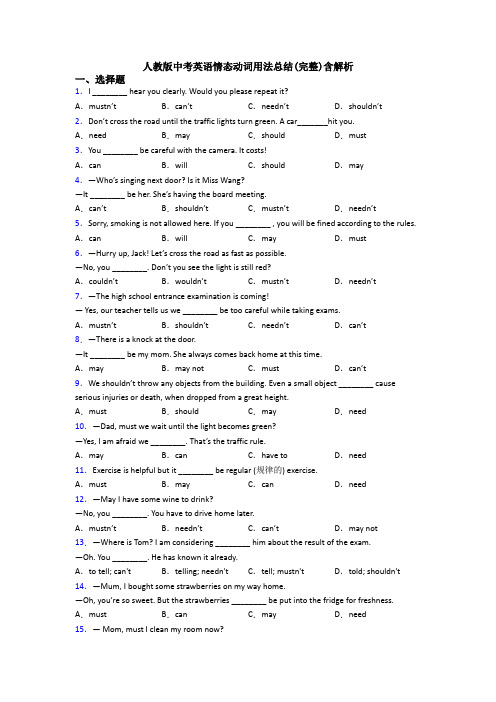
人教版中考英语情态动词用法总结(完整)含解析一、选择题1.I ________ hear you clearly. Would you please repeat it?A.mustn’t B.can’t C.needn’t D.shouldn’t 2.Don’t cross the road until the traffic lights turn green. A car_______hit you.A.need B.may C.should D.must3.You ________ be careful with the camera. It costs!A.can B.will C.should D.may 4.—Who’s singing next door? Is it Miss Wang?—It ________ be her. She’s having the board meeting.A.can’t B.shouldn’t C.mustn’t D.needn’t 5.Sorry, smoking is not allowed here. If you ________ , you will be fined according to the rules. A.can B.will C.may D.must 6.—Hurry up, Jack! Let’s cross the road as fast as possible.—No, you ________. Don’t you see the light is still red?A.couldn’t B.wouldn’t C.mustn’t D.needn’t 7.—The high school entrance examination is coming!— Yes, our teacher tells us we ________ be too careful while taking exams.A.mustn’t B.shouldn’t C.needn’t D.can’t 8.—There is a knock at the door.—It ________ be my mom. She always comes back home at this time.A.may B.may not C.must D.can’t9.We shouldn’t throw any objects from the building. Even a small object ________ cause serious injuries or death, when dropped from a great height.A.must B.should C.may D.need 10.—Dad, must we wait until the light becomes green?—Yes, I am af raid we ________. That’s the traffic rule.A.may B.can C.have to D.need 11.Exercise is helpful but it ________ be regular (规律的) exercise.A.must B.may C.can D.need 12.—May I have some wine to drink?—No, you ________. You have to drive home later.A.mustn’t B.needn’t C.can’t D.may not 13.—Where is Tom? I am considering ________ him about the result of the exam.—Oh. You ________. He has known it already.A.to tell; can't B.telling; needn't C.tell; mustn't D.told; shouldn't 14.—Mum, I bought some strawberries on my way home.—Oh, you’re so sweet. But the strawberries ________ be put into the fridge for freshness. A.must B.can C.may D.need15.— Mom, must I clean my room now?— No, you ________. You can do it after dinner.A.needn’t B.mustn’t C.shouldn’t D.can’t16.— Zoe, what do you think is the greatest advantage of shopping online?— At least I ______ spend much time going from shop to shop.A.shouldn’t B.can’t C.needn’t D.mustn’t 17.The boy is very brave.I ________ he ________ the tall tree.A.dare say; dares to climbB.dare to say; dare climbingC.dare saying; dares climbD.dare to say; dares climbed18.—The high school entrance examination is coming!—Yes, our teacher tells us we _______ be too careful while taking exams.A.mustn't B.shouldn't C.needn't D.can't19.---Will you be back early this evening?---Yes, but I ________ be a little late. Our boss sometimes has extra work for us.A.may B.must C.need D.will20.You ______ pay too much attention to your pronunciation, as it is so important in the oral (口头的) test.A.shouldn’t B.mustn’t C.can’t D.needn’t 21.—Shall we go camping this summer holiday?—Nothing________be better.A.should B.could C.must D.may 22.—Would you please________in that way? That’s not safe!—Sorry. I won’t do it any more.A.not driving B.not to drive C.no driving D.not drive 23.—Ready? Let’s get started, Martin.— Swimming? I just ________ get used to it in winter.A.can’t B.needn’t C.mustn’t D.shouldn’t 24.Dr. Zhong Nanshan once said, "To prevent the spread of this disease, we________never be too careful."A.can B.may C.must D.should25.You'd better __________ hard from now on, __________ you will fail the exam. A.work; and B.working; or C.working; and D.work; or 26.— Mum, why do I have to wash hands so many times a day?—You ________ be too careful, for your health.A.can’t B.mustn’t C.may not D.needn’t 27.—Could I join you in the programme?—Sorry, you ________. You are too young.A.shouldn’t B.mustn’t C.can’t D.needn’t28.To avoid ________, we’d better ________ the parents’ meeting onlin e.A.gather; hold B.gathering; hold C.gather; holding D.to gather; to hold 29.— Excuse me, could you tell me where the Nanjing Brocade Museum is?—Go along this road for five minutes. You ________ miss it. It’s a huge building.A.mustn’t B.can’t C.needn’t D.shouldn’t 30.—Why didn’t you tell it to me earlier?— Why ________ I? I want to have my own secret.A.can B.may C.should D.shall 31.—Mum, why do I have to wear a mask before entering the supermarket?—For your health and safety, you ________ be too careful.A.shouldn’t B.can’t C.mustn’t D.needn’t32.A hard-working man ________ become a great scientist, but a great scientist ________ be a hard-working man.A.can’t; can B.may not; must C.can’t; must D.may not; can 33.According to the rule, used batteries ________ be dropped in the red bin for harmful wastes. A.may B.would C.should D.might34.You _________ smoke here! Look at the sign. It says "No smoking".A.needn't B.mustn't C.can D.may35.— Listen! Tom ________ be listening to the music while doing his homework.—Let’s go upstairs to remind him to turn it off.A.should B.could C.would D.must36.—Must I finish all my homework today, Mum?—No, you ________, my dear. You can finish some tomorrow if you like.A.needn’t B.shouldn’t C.can’t D.mustn’t37.—I think they are enough. We ________ make so many chairs.—I don’t think so. Because nearly a quarter of them need ________.A.don’t need to; mending B.needed; to be mendedC.don’t need; mend D.need; to mend38.Most young people like shopping online because they ________ spend much time going from shop to shop.A.needn’t B.can’t C.mustn’t D.shouldn’t 39.—Is it really necessary for me to go shopping with a mask on?—I’m afraid you ________ in public. It is not only to protect yourself but also to protect others. A.must B.should C.can D.need40.—Will Jim come to Yangzhou for a holiday?—He ________come and it depends on how much homework he will have.A.may B.should C.must D.need41.—In China, many parents complain that their children have to stay up late to do the homework.—Don’t worry. The government has realized the problem. I’m sure there ________ be good newssoon.A.can B.should C.need D.must42.When people are waiting at the zebra crossing, cars and buses ________ wait and let them go first.A.must B.may C.can D.need43.—Will dad arrive home at 6 o’clock to have dinner with us this evening?— I think he will, but he ________ not. Sometimes he works extra hours.A.can B.must C.need D.may44.—Must we stop the Japanese government discharging nuclear waste water (排放核污水) into the Pacific Ocean?—________. Because everyone should protect our earth and it is bad ________ us to eat the polluted seafood and drink the waste water.A.Yes, we can; of B.No, we mustn’t; of C.Yes, we must; for D.No, we needn’t; for 45.Cars ________ give way to walkers on some roads in Binhai, or the drivers will be fined. A.may B.will C.can D.must46.You’ve got an A in the maths test again. You ________ be good at it.A.can B.may C.must D.should 47.—Could you tell me how to renew the library books?—With pleasure. You ________ come to our desk every time. It’s easier to renew them online. A.can’t B.mustn’t C.needn’t D.shouldn’t 48.—The article says that a person’s animal sign decides his personality.—You ________ read it for fun, but don’t believe in that.A.can B.must C.shouldn’t D.needn’t 49.—How beautiful the winter jasmines (迎春花) are!—Yes. These golden-yellow flowers ________ be widely seen in my city in March.A.must B.can C.would D.should 50.—Suzy described every detail of the accident just now.—Her memory ________ be completely back.A.shall B.need C.must D.could【参考答案】***试卷处理标记,请不要删除一、选择题1.B解析:B【详解】句意:我听不清你说什么。
【中考英语考点详解+专项训练】专题9 情态动词 (原卷版)

情态动词是初中英语里的一个重要的语法项目,也是全国各省市中考试题的考查热点。
在备战中考时,考生要牢记情态动词的结构和意义以及其表示推测时的用法,多做练习,在实践中加以区分。
中考考查重点:1. 情态动词的意义;2. 情态动词的基本句型;3. 情态动词的基本用法。
情态动词的用法情态动词用法例句can/could 表示能力,意为"能,会"I can read this sentence in English. 我能用英语读这句话。
表示许可时,意为"可以,能够",相当于mayShe said that I could use her computer. 她说我可以使用她的电脑。
用于推测,表示可能性,意为"可能",could比can更加不肯定,多用于否定或疑问句The man can’t be our teacher — he has gone to Beijing.那个男人不可能是我们的老师,他去北京了。
There is someone outside — who can it be? 有人在外面,可能是谁呢?【知识拓展】1. can的一般疑问句,肯定回答用Yes, ...can;否定回答用No, ...can’t。
—Can you play the piano? 你会弹钢琴吗?—Yes, I can. 是的,我会。
/No, I can’t 不,我不会。
2. can,could和be able to的区别:can只有现在式和过去式,而be able to可以用于各种时态;can( could)表示能力时,可用be able to代替。
I can(am able to) afford the car. 我能买得起这辆小汽车。
She has been able to come to school. 她已经能去学校了I could(=was able to) drive a car before I left school. 毕业前我就会开车。
初中英语情态动词详细用法归纳含练习及答案

初中英情用法(含及答案)考点一: can, may , must等情在述句中的用法:1. can 的用法:( 1).表示能力、可、可能性。
表示能力一般“能、会”,即有种能力,特别是生来具的能力 .如: She can swim fast, but I can’能她t.游得很快,但我不可以。
I can see with my eyes. 我用眼睛看。
could 是 can 的去式。
表示去的能力。
be able to do sth. 经常指努力,花了和力以后才能做到某事。
is/am/are able to do sthwas/were able to do sth.(2) .表示可,常在口中。
如: You can use my dictionary.你能够用我的词典。
( 3).表示推,可能性,意“可能”,常用于否认句和疑句中,此can’t“ 不可以能”。
如:Can the news be true? 个信息会是真的?— Can it be our teacher?那个人有可能是我老?— No, it can ’t be our teacher. He is on a visit to the Great Wall不可以.能。
咱老正在游城呢。
【例】— I think Miss Gao must be in the library. She said she would go there.—No. She __be there, I have just been there. A.can ’ t B.mustn ’ tC.needn ’ tD.wouldn ’t【分析】依据下文“我去那边”可知,“ 不可以能”,can’t表示推[答案] A could 的用法:(1).can 的去式,意“能、会”,表示去的能力。
如:He could write poems when he was 10. 他十就会写。
( 2) . could 在疑句中,表示委宛的气,此could 没有去式的意思。
初中英语中考情态动词考点及练习

情态动词情态动词又叫情态助动词;它们具有以下特点:⑴它们必须与其他动词连用,即:情态动词+动词原形表示说话人对所述动作的看法,如需要、可能、意愿或怀疑等;⑵绝大多数情态动词没有人称和数的变化,即第三人称单数不加-s以be和have 开头的情态动词短语除外;⑶在意义上,情态动词具有“多义性”;例:can既可表示能力,又可表示可能、允许等意义;情态动词的基本用法1. can的基本用法:⑴表示体力或智力上的能力,即“能够,会”,可与be able to转换;例:He can speak English. = He is able to speak English.—Can you play basketball— No, I can’t.如果表示将来具备的能力,要用will be able to;例:If I have a good sleep, I will be able to do the problem.⑵表示许可,主要用于口语,书面语一般用may;例:—Can we go home now, please— No, you can’t.You can only smoke in this room.You can’t keep the library books for more than a month.⑶表示“可能”,与may同义,但一般用在疑问句中;例:What can he possibly want在否定句中,否定形式can’t表示推测“不大可能”;例:Anybody can make mistakes.The news can’t be true.与第一、二人称连用时,还可以就可能的解决问题的方式或可能的行为提出建议;在这里,也可用could使语气婉转;例:Can / Could we meet again next week 下周我们可以再见面吗—What shall we do 我们怎么办呢— We can / could try asking Lucy for help.——我们可以请露茜帮忙试试看;You can / could help me with the cooking. 你可以帮我做饭;2. may的基本用法:⑴表示“许可”,用can比较口语化;例:You may / can come if you wish. 如果你想来,你就来;You may not pick flowers in this park. 本公园内不许摘花;may not表示按规定不许可,如果用mustn’t则表示说话人不许可;我可以在这里抽烟吗—;mustn’t表示明确的禁止;⑵;例:It may rain tomorrow. 明天可能会下雨;;注意:如果,通常用例:那会是真的吗他究竟是谁呢⑶注意—Yes, you —No3. must的基本用法:⑴表示必须,强调说话人的主观意志;例:I must go now, or I’ll be late.You must be here by注意:表示“必须“时,must的否定式为或而不是mustn’t;也就是:—Must—Yes, you—No, you例:——No, you .⑵表示推测,一般只用于肯定陈述句,表示非常肯定;例:She didn’t look at me. She must be angry. 她不朝我看,一定是生气了;He is good at English. He must know the word. 他英语好,准知道这个词;You must be Mr. Jones. 想必您就是琼斯先生吧;4. have to的基本用法:have to可视为情态动词,但它与其他情态动词在用法上稍有不同;其他情态动词没有人称和数的变化,而have to却有人称和数的变化,要视主语的不同而变化;例:I / You / We / They have to….He / She / It has to….You don’t have to….意思是“必须,不得不”;have to强调客观需要;例:Sorry, I have to leave now. 对不起,现在我得走了;I’ve got to go to a meeting. 我得去参加一个会议;Will he have to work deep into the night 他将不得不工作到深夜吗5. need的基本用法:need的基本词义是“需要”,它既可作情态动词,又可作实义动词;⑴ need用作情态动词时,只用于否定句和疑问句;它只有一种形式,后接动词原形;例:I don’t believe you need worry. 我相信你没有必要焦急;—Need we go so soon我们需要这么早就去吗— Yes, we must. / No, we needn’t.是的,必须;/不,不必;So I needn’t tell him, need I 所以我不需要告诉他,对吧请比较以下两句话的不同意思:You needn’t buy the coat. 你没有必要买那件外衣;你还没买You needn’t have bought the coat. 你没有必要买这件外衣的;而你⑵My watch needs mending/to be mended. 我的手表需要修理了;We don’t need to work today. = We needn’t work today.Does he need to go right now = Need he go right now6. had better的基本用法:had bette r常略作’d better;现代语法认为它是一个助动词,因为它后接不意思是“最好做某事;还是做某事比较好”;get some sleep. 你最好睡一会儿;You’d better not do that again. 你最好别再做那件事;What had we better do now 我们现在怎么做才好呢, should, would, might表示推测:①.must多用于肯定句中表示把握性极大的推测,意思为“一定、肯定”;如: You have worked hard all day. You must be tired. 你已辛苦工作一整天了,一定累了;The book must be his. His name is on the cover. 这本书一定是他的,封面上写着他的名字;注意 must不表推测时,在肯定句中意思为“必须强调内在的职责”,在否定句中意思为“不许、禁止”,以它开头的疑问句否定回答常用needn’t或don’t doesn’t have to;如:We must obey the traffic rules. 我们必须遵守交通规则;Cars mustn’t be parked here. 此处严禁停车;—Must we hand in the papers this week 我们必须本星期交论文吗—No, you needn’t. 不,你们不必本星期交;②. can / could多用于否定句、疑问句或间上没有差别;用can时不相信的程度更强一些,如:The man under the tree can’t be Tom人不可能是Tom,他已经去英国了;Can it be true that he was fooled by a five-year-old boy 他被一个五岁的孩子愚弄了,这能是真的吗Could this be an excuse 这会不会是个借口How can you be so careless 你怎么这样粗心③.may / might多用来表示把握性不大的推测,意思为“也许、可能”, might比;注意区分“不可能”与“可能;如:Mr. Wang may know Professor Li’s telephone number.王先生也许知道李教授的电话号码;This might be the key Tom has been looking for.这可能就是汤姆一直在找的钥匙;She may not be there today. 今天她可能不在那儿;一、典型例题中考链接1.—Who is the man over there Is it Mr. Li— No, it ______ be him. Mr. Li is much taller.A. mustn’tB. may noC. can’tD. needn’t2.—Must I go with them tomorrow— No,you ______.A. mustn'tB. shouldn'tC. needn'tD. can't3.—______ I take some photos in the hall— No, you ______.A. Can, needn’tB. Must, mustn’tC. Could, won’tD. May, m ustn’t4.—Dad, must I finish my homework today—No, you ________. You may do it tomorrow.A. needn’tB. mustn’tC. don’tD. won’t5.—The lake is said to be dry. Is that true—It , some kids are swimming in it.A. must be trueB. can’t be trueC. may not be true6.—What is your mother going to do this Saturday—I’m not sure. She _____ go to see my grandmother.A. canB. mustC. may7.—Susan has bought a large house with a swimming pool.—It ______ be very expensive. I never even dream about it.A. mustB. mightC. can’tD. shouldn’t8.—Listen Is Professor Johnson giving a report in the hall —No, it be him. He has gone to Japan.A. needn’tB. may notC. mustn’tD. can’t9.—Let’s go to the West Hill Park by taxi.—Oh, it is not far away from here. We _______take a taxi.A. couldn’tB. mustn’tC. needn’tD. can’t10.—Can you play the piano—Yes, I _______. I often practice it on weekends.A. needn’tB. needC. can’tD. can三、课后练习一、用can, may, must, need, have to, had better的适当形式填空:1.You ________________ return the library book on time.2.I ______________ not find the way to the hospital. _______________ youshow me the way3.—________________ I finish the work right now— No, you ________________ not. You ____________ do it later.4.He said he ________________ not come tonight.5.Her mother was ill. She ________________ stay at home and look afterher.6.It’s time for class. You ________________ stop playing football oryou __________be late for class.7.We ________________ start right now, or they would get there first.8.The cloud is lifting, so it ________________ not be a rainy daytomorrow.二、选择填空1.—Do we have to finish our homework this afternoon—Yes, you ________.A. mustB. canC. mayD. need2. —Must I be in hospital for a week, Doctor—No, you . You can go back home tomorrow.’t B.needn’t C. must3. The desk is not dirty. You _______clean it.A. mustn’tB. shouldn’tC. needn’t C. can’t4. —May I watch TV for a while—No, you _______. You have to finish your homework first.A. shouldn’tB. needn’tC. mustn’tD.won’t5.—Is Jessica giving us a speech this evening—No, it ________be her. She________ to Japan.A. mustn’t; has goneB. mustn’t ;has beenC. can’t ;hasgone D. can’t ;has been6. It’s the library So you________ know shouting is no t allowed here.A. canB. mustC. needD. may7. Boys and girls, don’t forget your report . It ______ today.A. can’t finishB. can’t be finishedC. should finishD. should be finished8.—Mr Smith must have been to your home this morning.—No, he ______ ,because he didn’t know my address.A. couldn’tB. can’tC. mustn’tD. may not9. —Must I mop up the window now—No, you________.’t B. can’t C. shouldn’t D. mustn’t10. —Is Lucy knocking at the door—No. It ________ be Lucy. She is in Japan now.A. needn’tB. mustC. can’t11. —Another cup of coffee—No, thanks. I _____ be off. Mary is waiting for me.A. canB. mayC. mustD. might12. —I’m a little tired. Let’s go to t he zoo by taxi.—We take a taxi. It’s not far from here.A. can’tB. mustn’tC. couldn’tD.needn’t13. If the traffic light is red, you ________ cross the road. It’s very dangerous.A. don’tB. mustn’tC. needn’tD.wouldn’t14. —Must I finish watering the flowers now—No, you________.A. mustB. won’tC. needn’tD. can’t15. —I can’t give up smoking, doctor.—For your health, I’m afraid you ________.A. mayB. canC. have toD. must。
2021年上海市中考英语语法复习:情态动词讲解及提升练习(有答案)
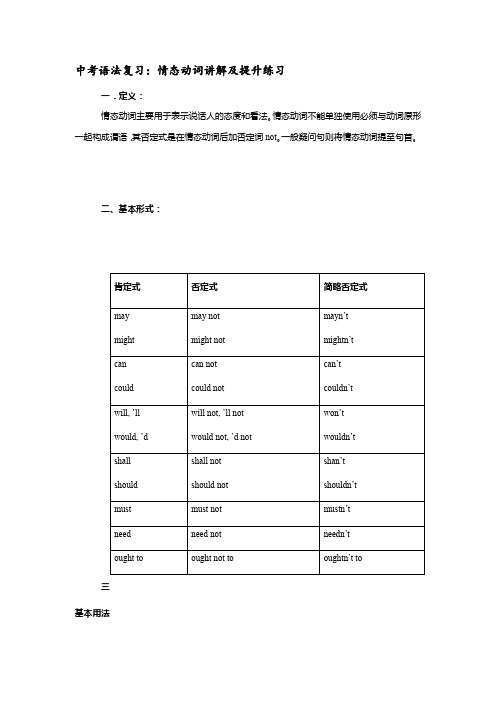
中考语法复习:情态动词讲解及提升练习一.定义:情态动词主要用于表示说话人的态度和看法。
情态动词不能单独使用必须与动词原形一起构成谓语,其否定式是在情态动词后加否定词not。
一般疑问句则将情态动词提至句首。
二、基本形式:三基本用法1. can 的用法1)表能力can表能力时意味着凭体力或脑力或技术等可以无甚阻力地去做某事。
I can climb this pole. 我能爬这根杆子。
He is only four , but he can read. 他只有4岁,但已认得字了。
Fire can’t destroy gold. 火烧不毁金子。
2)表可能性多用于否定与疑问结构中,但也可用在肯定句中。
Can the news be true? 这消息可能是真的吗?It can’t be true. 它不可能是真的。
What can he possibly mean? 他可能是什么意思?3)表示允许(和may意思相近)常见于口语。
Can (May) I come in ? 我能进来吗?Can I smoke here ? 我可以在这里抽烟吗?2.could的用法1)表过去的可能和许可,Father said I could swim in the river. 爸爸说我可以在河里游泳。
2)表过去的能力I could swim when I was only six. 我刚六岁就能游泳。
3)表“允许”。
可表示委婉客气的提出问题或陈述看法,不是can的过去时态。
---Could I use your bike? ---Yes, you can./No, you can’t.注意:be able to 表示能力,意为“能够做成某事”,相当于can 的用法,但是有区别:can泛指一般的能力;be able to 则主要指成功做了某件事的能力。
3. may(might)的用法1)表示请求、可以、允许。
You may drive the tractor. 你可以开那台拖拉机。
人教版中考英语专项训练情态动词专题(含答案)
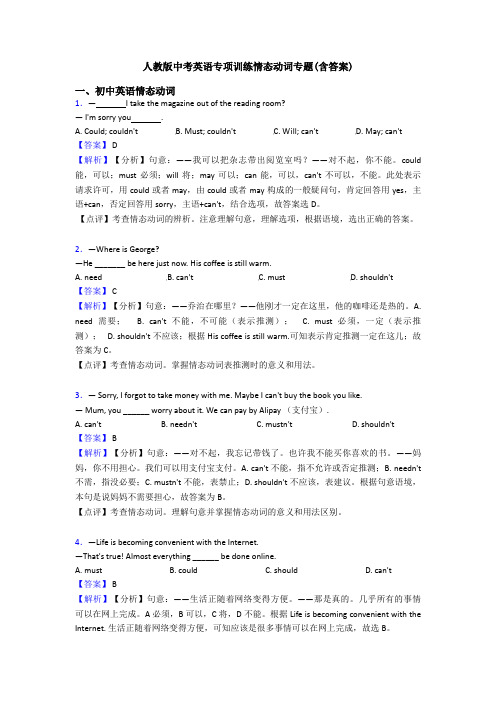
人教版中考英语专项训练情态动词专题(含答案)一、初中英语情态动词1.— I take the magazine out of the reading room?— I'm sorry you .A. Could; couldn'tB. Must; couldn'tC. Will; can'tD. May; can't【答案】 D【解析】【分析】句意:——我可以把杂志带出阅览室吗?——对不起,你不能。
could 能,可以;must必须;will将;may可以;can能,可以,can't不可以,不能。
此处表示请求许可,用could或者may,由could或者may构成的一般疑问句,肯定回答用yes,主语+can,否定回答用sorry,主语+can't,结合选项,故答案选D。
【点评】考查情态动词的辨析。
注意理解句意,理解选项,根据语境,选出正确的答案。
2.—Where is George?—He _______ be here just now. His coffee is still warm.A. needB. can'tC. mustD. shouldn't【答案】 C【解析】【分析】句意:——乔治在哪里?——他刚才一定在这里,他的咖啡还是热的。
A. need需要; B. can't 不能,不可能(表示推测); C. must 必须,一定(表示推测); D. shouldn't不应该;根据His coffee is still warm.可知表示肯定推测一定在这儿;故答案为C。
【点评】考查情态动词。
掌握情态动词表推测时的意义和用法。
3.— Sorry, I forgot to take money with me. Maybe I can't buy the book you like.— Mum, you ______ worry about it. We can pay by Alipay (支付宝).A. can'tB. needn'tC. mustn'tD. shouldn't【答案】 B【解析】【分析】句意:——对不起,我忘记带钱了。
2023年江苏中考英语核心语法精讲精练专题09 情态动词-含详解
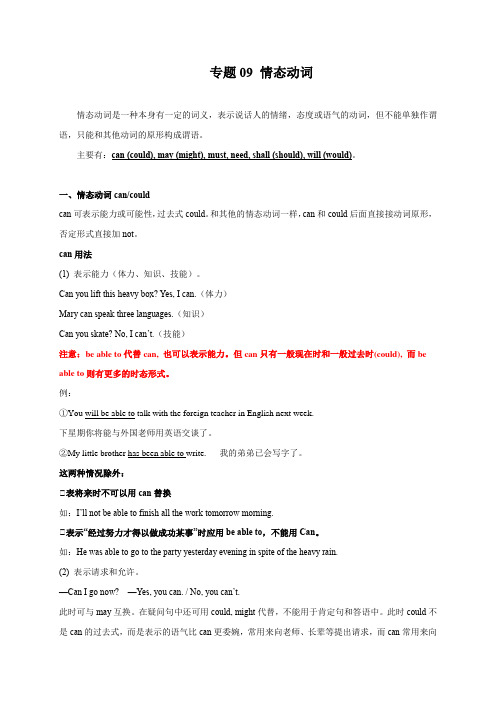
专题09 情态动词情态动词是一种本身有一定的词义,表示说话人的情绪,态度或语气的动词,但不能单独作谓语,只能和其他动词的原形构成谓语。
主要有:can (could), may (might), must, need, shall (should), will (would)。
一、情态动词can/couldcan可表示能力或可能性,过去式could。
和其他的情态动词一样,can和could后面直接接动词原形,否定形式直接加not。
can用法(1) 表示能力(体力、知识、技能)。
Can you lift this heavy box? Yes, I can.(体力)Mary can speak three languages.(知识)Can you skate? No, I can’t.(技能)注意:be able to代替can, 也可以表示能力。
但can只有一般现在时和一般过去时(could), 而be able to则有更多的时态形式。
例:①You will be able to talk with the foreign teacher in English next week.下星期你将能与外国老师用英语交谈了。
②My little brother has been able to write. 我的弟弟已会写字了。
这两种情况除外:①表将来时不可以用can替换如:I’ll not be able to finish all the work tomorrow morning.①表示“经过努力才得以做成功某事”时应用be able to,不能用Can。
如:He was able to go to the party yesterday evening in spite of the heavy rain.(2) 表示请求和允许。
—Can I go now? —Yes, you can. / No, you can’t.此时可与may互换。
中考英语情态动词专项练习(附答案及详细解析)!
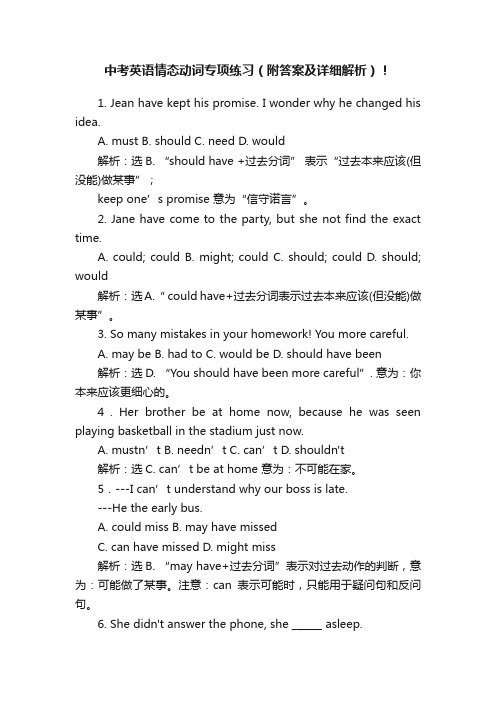
中考英语情态动词专项练习(附答案及详细解析)!1. Jean have kept his promise. I wonder why he changed his idea.A. mustB. shouldC. needD. would解析:选B. “should have +过去分词” 表示“过去本来应该(但没能)做某事”;keep one’s promise 意为“信守诺言”。
2. Jane have come to the party, but she not find the exact time.A. could; couldB. might; couldC. should; couldD. should; would解析:选A.“ could have+过去分词表示过去本来应该(但没能)做某事”。
3. So many mistakes in your homework! You more careful.A. may beB. had toC. would beD. should have been解析:选D. “You should have been more careful”. 意为:你本来应该更细心的。
4.Her brother be at home now, because he was seen playing basketball in the stadium just now.A. mustn’tB. needn’tC. can’tD. shouldn't解析:选C. can’t be a t home 意为:不可能在家。
5.---I can’t understand why our boss is late.---He the early bus.A. could missB. may have missedC. can have missedD. might miss解析:选B. “may have+过去分词”表示对过去动作的判断,意为:可能做了某事。
中考英语情态动词100及答案
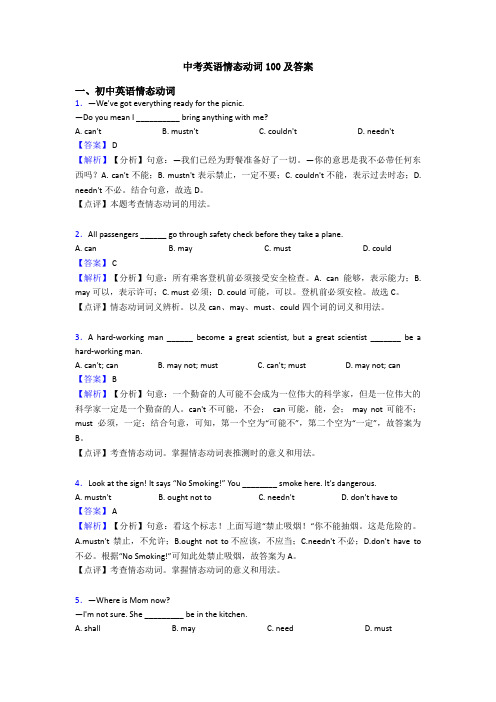
中考英语情态动词100及答案一、初中英语情态动词1.—We've got everything ready for the picnic.—Do you mean I __________ bring anything with me?A. can'tB. mustn'tC. couldn'tD. needn't【答案】 D【解析】【分析】句意:—我们已经为野餐准备好了一切。
—你的意思是我不必带任何东西吗?A. can't 不能;B. mustn't 表示禁止,一定不要;C. couldn't不能,表示过去时态;D. needn't不必。
结合句意,故选D。
【点评】本题考查情态动词的用法。
2.All passengers ______ go through safety check before they take a plane.A. canB. mayC. mustD. could【答案】 C【解析】【分析】句意:所有乘客登机前必须接受安全检查。
A. can能够,表示能力;B. may可以,表示许可;C. must必须;D. could可能,可以。
登机前必须安检。
故选C。
【点评】情态动词词义辨析。
以及can、may、must、could四个词的词义和用法。
3.A hard-working man ______ become a great scientist, but a great scientist _______ be a hard-working man.A. can't; canB. may not; mustC. can't; mustD. may not; can【答案】 B【解析】【分析】句意:一个勤奋的人可能不会成为一位伟大的科学家,但是一位伟大的科学家一定是一个勤奋的人。
can't不可能,不会;can可能,能,会;may not 可能不;must 必须,一定;结合句意,可知,第一个空为“可能不”,第二个空为“一定”,故答案为B。
初中英语情态动词详细用法归纳(含练习及答案)
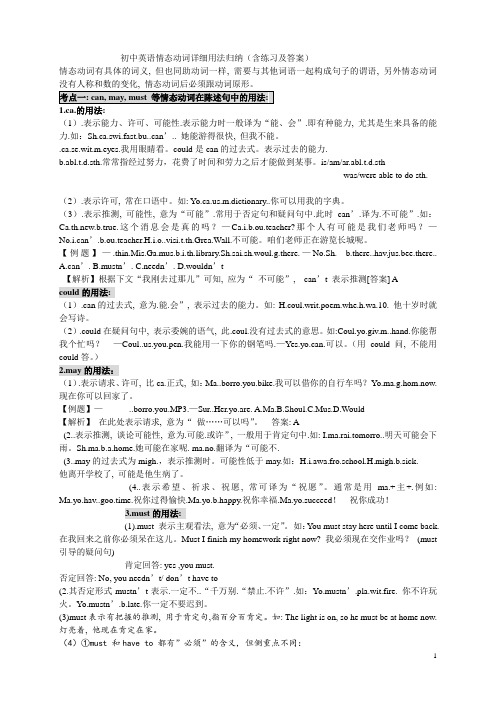
初中英语情态动词详细用法归纳(含练习及答案)情态动词有具体的词义, 但也同助动词一样, 需要与其他词语一起构成句子的谓语, 另外情态动词没有人称和数的变化, 情态动词后必须跟动词原形。
1.ca.的用法:(1).表示能力、许可、可能性.表示能力时一般译为“能、会”.即有种能力, 尤其是生来具备的能力.如:Sh.ca.swi.fast.bu..can’.. 她能游得很快, 但我不能。
.ca.se.wit.m.eyes.我用眼睛看。
could是can的过去式。
表示过去的能力.b.abl.t.d.sth.常常指经过努力,花费了时间和劳力之后才能做到某事。
is/am/ar.abl.t.d.sthwas/were able to do sth.(2).表示许可, 常在口语中。
如: .m.dictionary..你可以用我的字典。
(3).表示推测, 可能性, 意为“可能”.常用于否定句和疑问句中.此时can’.译为.不可能”.如:Ca.th.new.b.true.这个消息会是真的吗?—Ca.i.b.ou.teacher?那个人有可能是我们老师吗?—No.i.can’.b.ou.teacher.H.i.o..visi.t.th.Grea.Wall.不可能。
咱们老师正在游览长城呢。
【例题】—.thin.Mis.Ga.mus.b.i.th.library.Sh.sai.sh.woul.g.there.—No.Sh.__b.there..hav.jus.bee.there..A.can’.B.mustn’.C.needn’.D.wouldn’t【解析】根据下文“我刚去过那儿”可知, 应为“不可能”, can’t 表示推测[答案] Acould的用法:(1).can的过去式, 意为.能.会”, 表示过去的能力。
如: H.coul.writ.poem.whe.h.wa.10. 他十岁时就会写诗。
(2).could在疑问句中, 表示委婉的语气, 此.coul.没有过去式的意思。
情态动词讲解-练习题和答案
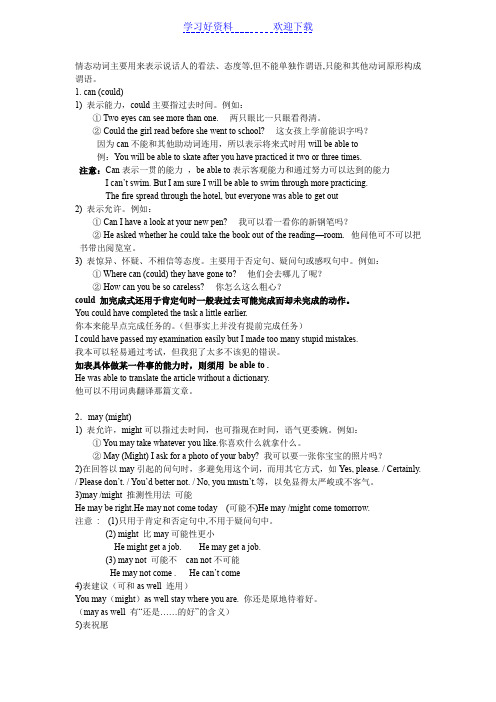
情态动词主要用来表示说话人的看法、态度等,但不能单独作谓语,只能和其他动词原形构成谓语。
1. can (could)1) 表示能力,could主要指过去时间。
例如:① Two eyes can see more than one. 两只眼比一只眼看得清。
② Could the girl read before she went to school? 这女孩上学前能识字吗?因为can不能和其他助动词连用,所以表示将来式时用will be able to例:You will be able to skate after you have practiced it two or three times.注意:Can表示一贯的能力,be able to表示客观能力和通过努力可以达到的能力I can’t swim. But I am sure I will be able to swim through more practicing.The fire spread through the hotel, but everyone was able to get out2) 表示允许。
例如:① Can I have a look at your new pen? 我可以看一看你的新钢笔吗?② He asked whether he could take the book out of the reading—room. 他问他可不可以把书带出阅览室。
3) 表惊异、怀疑、不相信等态度。
主要用于否定句、疑问句或感叹句中。
例如:① Where can (could) they have gone to? 他们会去哪儿了呢?② How can you be so careless? 你怎么这么粗心?could 加完成式还用于肯定句时一般表过去可能完成而却未完成的动作。
You could have completed the task a little earlier.你本来能早点完成任务的。
中考英语情态动词专题练习(含解析)

中考英语 -神态动词专题练习(含分析)一、单项选择题1.Hurry up! Your homework in one hour.A. must finishB. will finishC. must be finishedD. won't finish2. — How nice the building is! What is it for?— It_______ a hotel. But I'm not sure.A. must beB. have to beC. may beD. can be3. — May I use your mobile phone for a while, Mum?— No, you. You have already used it to play for two hours.A.shouldn'tB.needn'tC.mustn'tD.won't4. — Is John coming by train?— He should, but he A.mustC. may not. He likes driving his car, but I'm not quite sure.B.canD. need5.一 I hear you have a home robot.一 Yes,it's amazing. It do all my housework.A. mustB. shouldC. couldD. can6.-- May I borrow your books?-- Yes,you______.A. mayB. canC. mustD. need7. — I can't stop playing computer games.— For your health and study, my boy, I am afraid you .A. canB. mayC. mustD. have to8.This toy Mickey Mouse _______be Amy's. She's the only kid at thepicnic.A. mustB. canC. needD. can't9.Look at the sign! It says“ No Smoking!” You ________ smoke here. It' dangerous.A. mustn'tB. ought not toC. needn'tD. don't have to10. — Can you stay here for the party?— Sorry, I ______. I have to go to a meeting.A. can'tB. mustn'tC. needn'tD.shouldn't11.—Must I return the book this morning?—No, you ______. But you ______ return it before supper.A. needn't; mustB. mustn't; canC. mustn't;may D. can't; need12. — _____ you go out to dinner with me tonight, Laura?—That's very nice of you, but I have other plans.A. ShouldB. NeedC. CanD. Must13.You____ return the book now. You can keep it next week if you like.A. mustB. mustn'tC. needn'tD. have to14. — I wonder if this smart phone is Mary's.—It ________ belong to her.________ is totally different from this one.A. mustn't; HerB. can't; HerC. can't;Hers D. may; Hers15.Living in the country side _____ fun, because the nature there is sobeautiful.A. can't beB. may beC. mustbe D. /16. — I saw Mr. Green at school this morning.—No, it _____ him. He flew to Canada last week.A. can beB. must beC. can'tbe17.—We need to tell people about the city park clean-up.—Let's handout notices. Or we __________ put up signs.A. couldB. have toC.must18.—Must I clean the room now, Mr. White?—No, you.A. shouldn'tB. needn'tC. wouldn'tD. can't19. —I take the PE test, Mr Zhang?—Yes, you must.A. CanB. WillC. ShouldD. Must20. — Why ______ we close that chemical factory?—Because it has caused lots of pollution. We need better environment.A. mustB. canC. may21.Is Mr. Smith in his office now?No, he there. I saw him in the library a minute ago.A. may beB. must beC. can'tbe D. won't be22.She said I should see a doctor.A. couldB. mustC. oughtto23.-- I don't care what my teachers think.-- Well, you.A. couldB. wouldC. shouldD. might24.The text is available online so you ________ have a copy of it now.A. can'tB. shouldn'tC. needn'tD.mustn't25.— Can your sister ______ volleyball?— Yse,she can. But she ______ play it very well.A. playing ;can'tB. playing; canC. play;can'tD. play; can26.The man is feeling much better now, so you ______ call a doctor.A. can'tB. mustn'tC. needn'tD. shouldn't27. — ________ we clean the classroom immediately?—No, you ________. You ________ clean it after school.A. Must; needn't; canB. Need; mustn't; mayC. Must; mustn't; canD. Shall; can't; may28. — Can I walk across the road now, mum?— No, you_______. You have to wait until the light turns green. A. couldn't B. shouldn't C. mustn'tD. needn't29.Ann can _________ Chinese songs very well.A. singB. singsC. singing二、填空题30.用神态动词填空。
- 1、下载文档前请自行甄别文档内容的完整性,平台不提供额外的编辑、内容补充、找答案等附加服务。
- 2、"仅部分预览"的文档,不可在线预览部分如存在完整性等问题,可反馈申请退款(可完整预览的文档不适用该条件!)。
- 3、如文档侵犯您的权益,请联系客服反馈,我们会尽快为您处理(人工客服工作时间:9:00-18:30)。
中考英语情态动词详细用法归纳及练习含答案情态动词有具体的词义,但也同助动词一样,需要与其他词语一起构成句子的谓语,另外情态动词没有人称和数的变化,情态动词后必须跟动词原形。
1. can 的用法:(1).表示能力、许可、可能性。
表示能力时一般译为“能、会”,即有种能力,尤其是生来具备的能力.如:She can swim fast, but I can’t . 她能游得很快,但我不能。
I can see with my eyes. 我用眼睛看。
could是can的过去式。
表示过去的能力。
be able to do sth. 常常指经过努力,花费了时间和劳力之后才能做到某事。
is/am/are able to do sthwas/were able to do sth.(2).表示许可,常在口语中。
如:You can use my dictionary. 你可以用我的字典。
(3).表示推测,可能性,意为“可能”,常用于否定句和疑问句中,此时can’t 译为“ 不可能”。
如:Can the news be true? 这个消息会是真的吗?—Can it be our teacher?那个人有可能是我们老师吗?—No, it can’t be our teacher. He is on a visit to the Great Wall.不可能。
咱们老师正在游览长城呢。
【例题】—I think Miss Gao must be in the library. She said she would go there. —No. She __be there, I have just been there. A.can’t B.mustn’t C.needn’t D.wouldn’t【解析】根据下文“我刚去过那儿”可知,应为“ 不可能”,can’t 表示推测[答案] Acould的用法:(1).can的过去式,意为“ 能、会”,表示过去的能力。
如:He could write poems when he was 10. 他十岁时就会写诗。
(2). could在疑问句中,表示委婉的语气,此时could 没有过去式的意思。
如:Could you give me a hand? 你能帮我个忙吗?—Could I use your pen? 我能用一下你的钢笔吗? —Yes, you can.可以。
(用could问,不能用could答。
)2. may的用法:(1).表示请求、许可,比can 正式,如:May I borrow your bike? 我可以借你的自行车吗?You may go home now. 现在你可以回家了。
【例题】—_______ I borrow your MP3? —Sure . Here you are. A. May B.Should C.Must D. Would【解析】在此处表示请求,意为“ 做……可以吗”。
答案:A(2) .表示推测,谈论可能性,意为“ 可能,或许”,一般用于肯定句中。
如:It may rain tomorrow . 明天可能会下雨。
She may be at home. 她可能在家呢. may not 翻译为“可能不”(3) .may的过去式为might ,表示推测时。
可能性低于may。
如:He is away from school. He might be sick. 他离开学校了,可能是他生病了。
(4) . 表示希望、祈求、祝愿,常可译为“祝愿”。
通常是用may +主+V 例如:May you have a good time. 祝你过得愉快。
May you be happy! 祝你幸福!May you succeed!祝你成功!3. must的用法:(1).must 表示主观看法,意为“必须、一定”。
如:You must stay here until I come back.在我回来之前你必须呆在这儿。
Must I finish my homework right now? 我必须现在交作业吗?(must引导的疑问句)肯定回答:yes ,you must.否定回答:No, you needn’t/ don’t have to(2) 其否定形式mustn’t表示“ 一定不要” “千万别” “禁止, 不许”. 如:You mustn’t play with fire. 你不许玩火。
You mustn’t be late. 你一定不要迟到。
(3)must表示有把握的推测,用于肯定句,指百分百肯定。
如: The light is on, so he must be at home now.灯亮着,他现在肯定在家。
(4)①must 和have to 都有”必须”的含义,但侧重点不同:must强调说话者主观(自己)的看法。
have to强调客观(外力作用)的需要,也可以翻译为“不得不”。
I must go to school and learn some Knowledge.我必须会学校上课学一些知识。
(自己要回)I have to go to school because the holiday is over.假期结束了我不得不回学校上课了。
②must 没有人称和数的变化,而have to 有动词单三形式:has to和动词过去式:had to将来时:will have tomust not=mustn’t 表示禁止…….当must提问时,肯定回答用must。
否定回答用needn’t 和don’t have to4. need的用法:(1).need做情态动词时:表示“需要、必须”,主要用于否定句和疑问句中,其否定形式为needn’t,意为“没有必要,不必”。
用need 提问时,肯定回答为must,否定回答为needn’t或don’t have to。
如:—Need I do my homework now?—Yes, you must .是的。
—No. you needn’t /don’t have to. 不,你不必。
(2).need 还可以作实义动词,此时有人称、数和时态的变化,如果主语是人sb.:sb. need(s) sth. 某人需要某物sb. need to do sth. 某人需要去做某事need的单三needs. 过去式needed。
变否定借助don’t/doesn’t /didn’t如:I need to pass the exam. 我需要通过这次考试。
He needs to learn English .他需要学习英语。
如果主语是物sth.:Sth. need doing 某事需要被做= need to be done这种情况下应注意两点:①.主动形式的动名词doing具有被动的含义;②.该动名词可以改为其动词不定式的被动形式而句子的意义不变。
例如:. Your car needs washing. = Your car needs to be washed. 你的车需要洗了。
5. shall 的用法:shall表示征求对方意见(多用于第一、三人称),如:Shall we go out for a walk? 我们出去散步好吗?在英语中,我们可以用其他多种方式提出我们的建议或征求对方意见。
Shall意为”要不要…..? ‘“……好吗?”’用于第一人称,表将来,而will可用于任何人称。
(1).用“Let's do...”来提出建议。
如:Let's go for a walk after supper.(2).用“What/How about...?”来提出建议;about后接名词或动词ing形式。
如:What about/How about a drink? What about/How about taking Tom with us?(3).用“Why not...?”来提出建议,表示“何不……”not面后接动词原形。
“Why not...?”实际上是“Why don't you/we...?”的简略形式。
如:Why not meet at the school gate at eight? Why don't we stay here another day? (4).用“Would you like...?”来提出建议,意思是“你想要……吗?”Would you like后可接名词或不定式。
如:Would you like a cup of tea?Would you like to go and see her?因此,如果我们说:“去游泳好吗?”英语中可有这样几种表达法:Shall we go for a swim?Let's go for a swim,shall we?What about/How about going swimming?Why not go for a swim?Would you like to go for a swim?What do you think of going for a swim?6. should的用法:(1).should 意为“应该” ,可表示劝告、建议、义务、责任等。
如:We should protect ourselves.. 我们应该我们自己。
should not=shouldn’t +do动词原形had better 的用法:had better 意为“最好”,没有人称的变化,后接+动词原形,其否定形式为:had better not。
如:We had better go home now. 我们最好现在回家。
You had better not go home now.你最好现在不要回家。
should和had better 可以互换should not=shouldn’t和had better not可以互换7. will 的用法:Wil l①表示意愿、意志、打算,可用于多种人称。
如:I will help you if I’m free this afternoon.今天下午如果我有空,我就会帮你。
②是一般将来时的“标志词”,will+ do动词原形注意:1、will在there be句型中的形式及其句式变换。
由于“一般将来时”的结构可以用“will+动词原形”来表示,所以there be句型的一般将来时的形式就是there will be。
(一定不能说there will have)例如:There are many students in our school. →There will be many students in our school. There will be a sports meeting next week. 一定不能说:There will have a sports meeting next week.2、will 与be going to do sth区别:①. be going to 表示打算,计划,安排要去做的事情或有预兆即将发生某事,will 表示的将来时间则较远一些,如:He is going to Beijing on National Day.He will write a book some day.②. be going to 表示根据主观判断将来肯定发生的事情,will表示客观上将来势必发生的事情。
